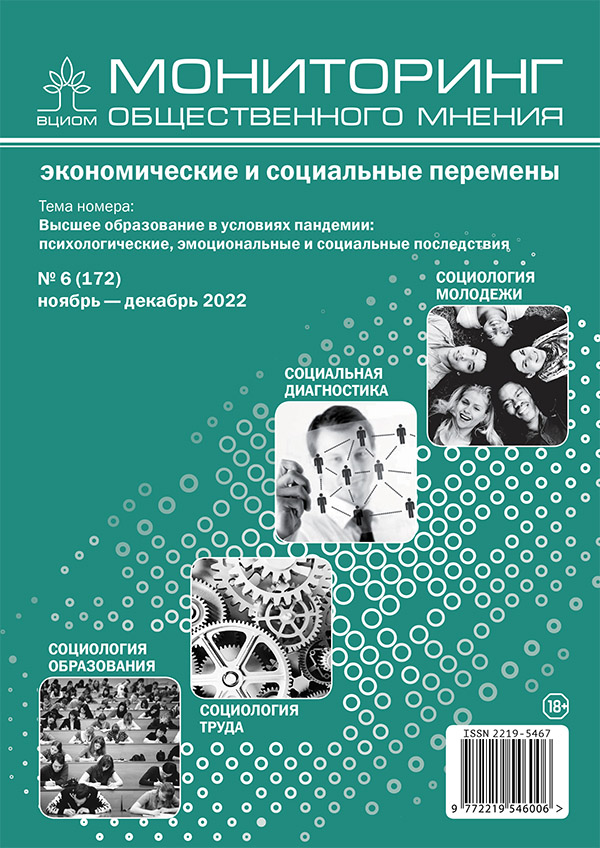Влияние пандемии коронавируса на студенчество — сравнительный межстрановый анализ
DOI:
https://doi.org/10.14515/monitoring.2022.6.2267Ключевые слова:
социальные последствия COVID-19, студенческая молодежь, сравнительный анализ, гендерное неравенство, экономическое неравенство, социально-психологическое благополучие, условия жизни студентовАннотация
Студенческая молодежь стала одной из наиболее уязвимых социальных групп в период пандемии COVID-19. Исследователи уже отмечали ее влияние на душевное здоровье и самочувствие студентов, их успеваемость, социальные связи. Для комплексного анализа эффектов пандемии, включая контекстуальные, учебные, поведенческие и эмоциональные показатели, использовались данные «Международного опроса о благополучии студентов во время коронавируса» ISWS-МОСК, проведенного в 25 странах в апреле — мае 2020 г. Из общенациональной выборки студентов в России в анализ включены только студенты вузов Москвы и Санкт-Петербурга, где влияние COVID-19 в первую волну проявилось наиболее сильно.
Исследование показало, что последствия пандемии имеют многовекторный характер и затрагивают почти все стороны жизни студентов. Наиболее значительные изменения коснулись восприятия учебного процесса — учебной нагрузки, качества обучения, понимания задач, требований и стандартов обучения, а также социальных связей, материального положения и социально-психологического самочувствия. Разные социальные группы подвергались давлению пандемии неодинаково. В России ее воздействие было более серьезным для девушек, чем для юношей, особенно в отношении социально-психологического состояния, материального положения, жилищных условий и социальных связей. Девушки в меньшей степени, чем юноши использовали компенсаторные практики, связанные с употреблением табачной продукции и алкоголя. Пандемия оказала более существенное влияние на малообеспеченные группы, чем на студентов со средним и высоким доходом, еще больше усилив материальное неравенство внутри студенческого сообщества.
Социальные последствия пандемии для студентов в разных странах схожи по типу и характеру, однако масштаб и глубина этого влияния различаются. Россия была отнесена к группе стран с относительно умеренным влиянием пандемии на жизнь студентов. Среди причин межстрановых различий значимость эпидемиологических факторов и длительности карантинных мер оказалась невелика. Наиболее важными буферами, которые позволили смягчить социальные последствия пандемии даже в условиях серьезной эпидемиологической угрозы, стали доверие государственным и политическим институтам, системе здравоохранения, общий уровень психологического благополучия в стране.
Загрузки
Опубликован
Как цитировать
Выпуск
Раздел
Лицензия
Copyright (c) 2022 Мониторинг общественного мнения: экономические и социальные перемены

Это произведение доступно по лицензии Creative Commons «Attribution-NonCommercial-ShareAlike» («Атрибуция — Некоммерческое использование — На тех же условиях») 4.0 Всемирная.






